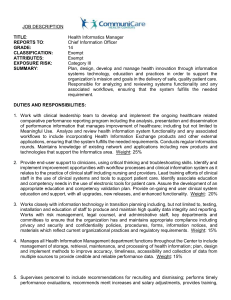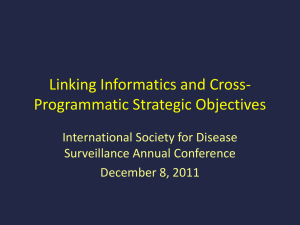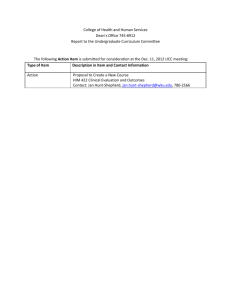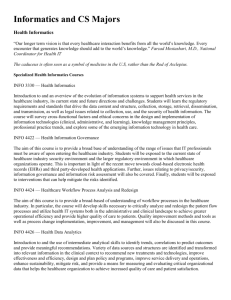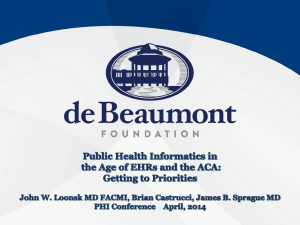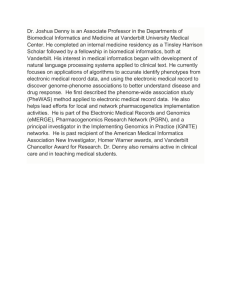Program Prospectus - Kennesaw State University
advertisement
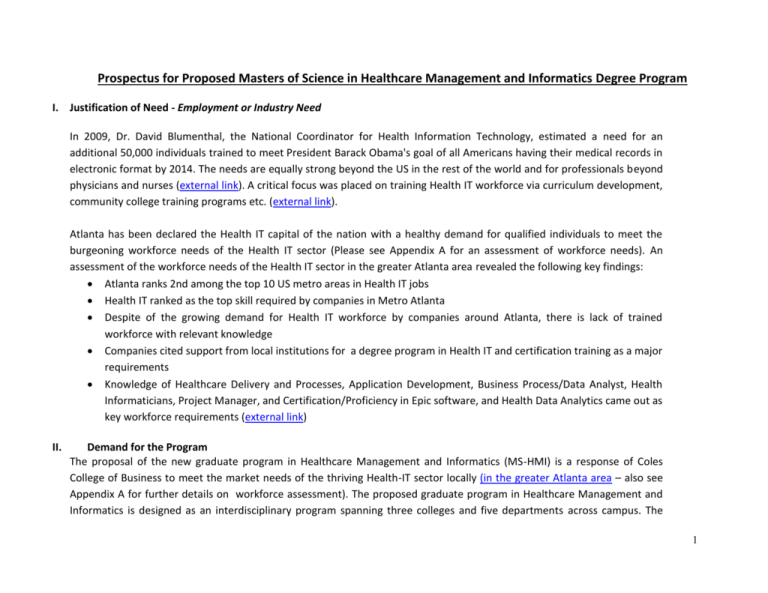
Prospectus for Proposed Masters of Science in Healthcare Management and Informatics Degree Program I. Justification of Need - Employment or Industry Need In 2009, Dr. David Blumenthal, the National Coordinator for Health Information Technology, estimated a need for an additional 50,000 individuals trained to meet President Barack Obama's goal of all Americans having their medical records in electronic format by 2014. The needs are equally strong beyond the US in the rest of the world and for professionals beyond physicians and nurses (external link). A critical focus was placed on training Health IT workforce via curriculum development, community college training programs etc. (external link). Atlanta has been declared the Health IT capital of the nation with a healthy demand for qualified individuals to meet the burgeoning workforce needs of the Health IT sector (Please see Appendix A for an assessment of workforce needs). An assessment of the workforce needs of the Health IT sector in the greater Atlanta area revealed the following key findings: Atlanta ranks 2nd among the top 10 US metro areas in Health IT jobs Health IT ranked as the top skill required by companies in Metro Atlanta Despite of the growing demand for Health IT workforce by companies around Atlanta, there is lack of trained workforce with relevant knowledge Companies cited support from local institutions for a degree program in Health IT and certification training as a major requirements Knowledge of Healthcare Delivery and Processes, Application Development, Business Process/Data Analyst, Health Informaticians, Project Manager, and Certification/Proficiency in Epic software, and Health Data Analytics came out as key workforce requirements (external link) II. Demand for the Program The proposal of the new graduate program in Healthcare Management and Informatics (MS-HMI) is a response of Coles College of Business to meet the market needs of the thriving Health-IT sector locally (in the greater Atlanta area – also see Appendix A for further details on workforce assessment). The proposed graduate program in Healthcare Management and Informatics is designed as an interdisciplinary program spanning three colleges and five departments across campus. The 1 implementation of the program will not only enhance KSU’s prominence in education, engagement, and innovation but will also support economic development in the state of Georgia. III. Non-Duplication of Similar Programs at USG Institutions The proposal of the new graduate program in Healthcare Management and Informatics (MS-HMI) is based on the assessment of the demand for Health IT workforce and current offerings of Health Informatics programs across US and the South-East region in particular. The primary goal of the proposed program is to educate and produce a robust workforce that has the skills and knowledge of the intersecting domains of healthcare, management, and informatics such that the graduates will be armed to fill diverse careers as developers, managers, and leaders of the evolving healthcare landscape. There are no premier graduate degree programs in the USG that are truly interdisciplinary (spanning three colleges and four departments) and which are addressing the unique domain of Healthcare Management and Informatics. In addition, the curricular contents of the proposed program have been mapped to meet the standards of CAHIM accredited program in Healthcare Informatics (http://www.cahiim.org/cas_system_resources.html). So far, no graduate program in healthcare informatics has been accredited by CAHIM in the state of Georgia. Appendix B provides further details on the existing health informatics and health administration degree and certificate programs in South-East US for comparative purposes. APPENDIX A - Workforce and Skills Assessment of Health IT Industry 1. http://www.metroatlantachamber.com/business/bioscience-health-it/focus/health-it 2. http://www.healthit.gov/buzz-blog/community-college-consortia/preparing-health-it-workforce-tomorrow/ 3. http://www.hhs.gov/news/press/2009pres/11/20091124a.html 4. To assess the demand of Health IT sector, we leveraged the report generated by Metro Atlanta Chamber of Commerce (MAC) Workforce Council in 2011 and 2012. The following provides key facts of the MAC Report of the review conducted in 2011 and 2012: 2 3 Positions with the strongest demand Positions Application Developer Currently employed 2,260 Technical skills needed for key positions* Analytical capability Positions Clinical Experience Data base mgmt Knowledge of healthcare Current unfilled positions 190 Projected demand over three years 1,560 Application Developer X X Business Analyst X X Network design X Business Analyst 1,525 90 1,320 Bus. Intel. Developer X X Client Service/Help Desk 1,500 25 1,235 Client Service/Help Desk X X Project Manager 1,375 170 1,190 Computer Operations X Sales Professional 1,375 290 880 Database Administrator X 735 65 775 Info Security Specialist X X Network Architect X X Project Manager X X X Sales Professional X X X Systems Analyst X Bus. Intel. Developer Info Security Specialist 595 25 730 Systems Analyst 1,160 90 700 Computer Operations 1,115 15 505 700 50 505 Database Administrator Network Architect 750 25 • Overviews on health care delivery were cited over 137 times as desired support • Other support included certification training, 2 year degree with HIT focus, and computer skills training X X X X Soft skills needed for key positions* Change management Positions Leadership Application Developer Business Analyst • 4 year degree w/ HIT focus were cited over 100 times X * These skills were cited 10 or more times as important 360 Support Desired from Local Institutions Reporting/ analytics X Bus. Intel. Developer Process improvement Project Management X X X X X X Client Service/Help Desk Sales & Customer Service X X Computer Operations X Database Administrator X X Info Security Specialist X X Network Architect X X X X X X X Project Manager Sales Professional Systems Analyst X X X X X * These skills were cited 10 or more times as important 4 State Level Assessment of Workforce and Industry Needs Description Georgia Department of Economic Development Annual Reports Georgia Department of Labor Occupational Trends 1. Occupational Supply Demand System: http://www.occsupplydemand.org/ 2. Georgia Labor Market Explorer: http://explorer.dol.state.ga.us/ 3. Occupational Employment Statistics: http://explorer.dol.state.ga.us/mis/oes.h tm Assessment - Increase in jobs by 30.8% in FY 2012 - Largest Projects in FY 2012 - Baxter International – Added 1800 jobs; Greenway Medical techonologies added 400 jobs. - Georgia’s Workforce Annual Report http://explorer.dol.state.ga.us/mis/Current/work forceannreport.pdf Reference STEM Hot careers (2010 – 2020): Medical and clinical technologists. Projected 200 annual openings. Healthcare Practitioners and Technical Occupations - .09% Medical and Health Services Managers - less than 0.005% Biomedical engineers - .02% Medical Scientists - less than 0.005% Medical Records and Health Information Technicians – 0.01% Medical Transcriptionists - less than 0.005% - Government and Education & Health Services sectors have shown growth during the last recession (2007 – 2009) Health Services has seen an increase of almost 95,000 jobs - Calender year job addition forecasted for 2013 : 23.2% - Staffing and temp agencies will see continued growth in niche markets including medical and technical staffing. 2007-2011 job increase of 1.8 percent, driven primarily by employment gains in two relatively large sectors: surgical Georgia State University, Economic Forecast Center http://robinson.gsu.edu/efc/ University of Georgia, Selig Center for Economic Growth http://www.terry.uga.edu/about/centersinstitutes/selig - 5 Georgia Bio, Life Sciences Partnership http://www.gabio.org/ - instruments manufacturing and medical laboratories. Current Job listing posted. APENDIX B - Assessment of Health Informatics Programs Across US University University of Alabama Birmingham University of Alabama Birmingham Georgia State University Georgia State University Degree MS Health Informatics MS Health Administration MBA/Master of Health Administration MS Health Administration Instate $626 for first credit hour, $431 subsequent $8167 per semester, $49,000 total $20,744 total Out-ofstate $1,208 for first credit hour, $1,013 subsequent Cost Length 48-50 hours, 6 semesters, 24 months 33 months Georgia Health Sciences University Masters of Public Health in Informatics University of Phoenix (online in GA) Master of Health Administrati on/Informat ics Emory University $20,744 total $4,373 $740 per credit; $115 electronic materials fee per course $15,800 for 2012-2013 $45,104 total $45,104 total $13,118 57-66 hours 36 hours 53 hours, 2 years 40 hours 48 hours, 4 semesters MSPH in Public Health Informatics 6 Program objectives Focus on ICT, health care delivery, leadership and management Place students in executive leadership positions in health services organizations Geared towards managers in healthcare and business organizations 7 concentrations available Focus on public health, health informatics, health care administrati on Online Mixed No No No Mixed Focus on biomedical sciences Yes No 7
